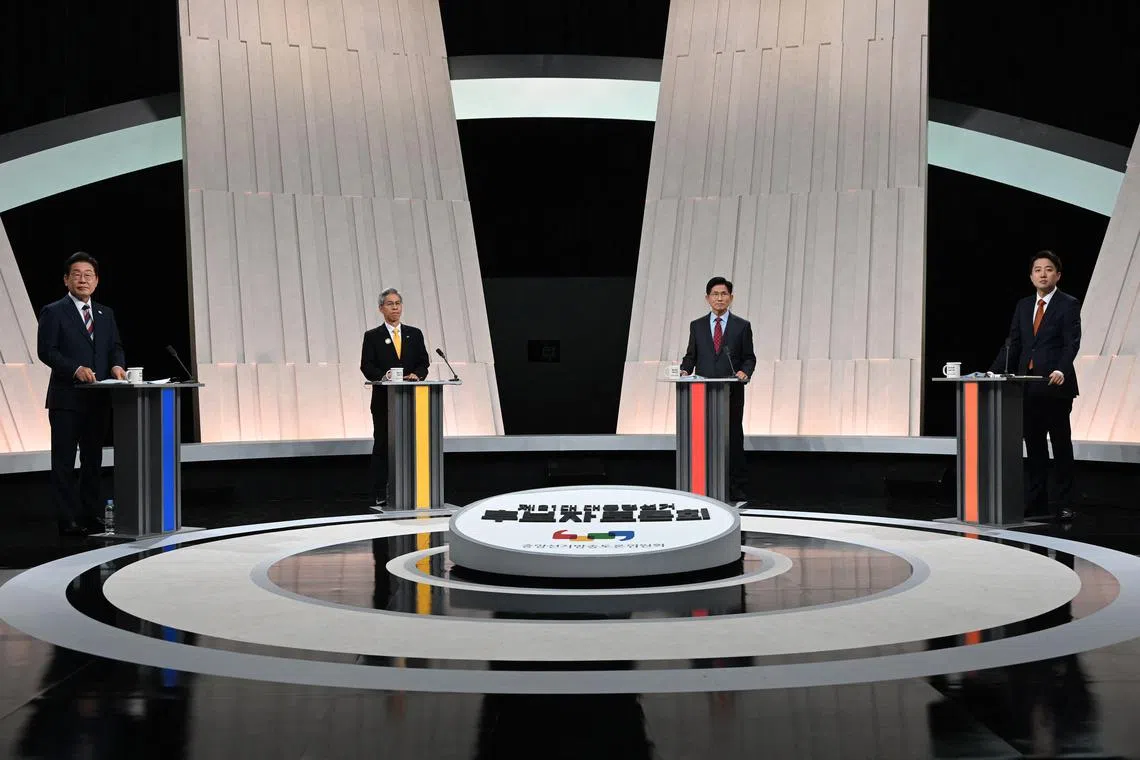South Korean presidential candidates debate about various issues in televised address
Sign up now: Get insights on Asia's fast-moving developments

South Korea's presidential candidates (from left) Mr Lee Jae-myung, Mr Kwon Young-guk, Mr Kim Moon-soo and Mr Lee Jun-seok participate in the third televised presidential debate on May 27.
PHOTO: AFP
SEOUL – The liberal Democratic Party of Korea’s presidential candidate Representative Lee Jae-myung pledged to start a dialogue and map out cooperation between the two Koreas and achieve peace on the Korean peninsula, reiterating his bid to de-escalate border tensions if elected president.
During a four-way televised debate aired on May 27, Mr Lee said peace and stability on the Korean peninsula are “very important”, adding that dialogue, cooperation and peace are necessary on the Korean peninsula, on the foundation of galvanised military strength, as well as the alliance between Seoul and Washington.
Mr Lee also blamed the former conservative Yoon Suk Yeol administration’s hardline stance against North Korea for heightening border tensions between the two Koreas, saying the Yoon administration failed to take action to stop anti-North propaganda leaflet campaigns from the South.
Mr Lee added that he would “resolve (border tensions) one by one”.
Meanwhile, Mr Lee’s conservative rival, the People Power Party’s candidate Kim Moon-soo, said he would work to strengthen South Korea’s nuclear deterrence on the foundation of the Seoul-Washington alliance to counter North Korea’s nuclear threats and missile provocations.
“We will create a South Korea that will not be shaken by any threat by achieving a balance of power,” said Mr Kim.
During the debate, Mr Kim said there is a realistic plan to devise a unique nuclear sharing model with the United States, which Mr Lee said “will make it impossible to achieve denuclearisation on the Korean peninsula”.
Mr Kim also said he would foster transparent inter-Korean relations and deal with North Korea confidently, while blasting his liberal rival for alleged involvement in an aide’s unauthorised money transfer to North Korea while Mr Lee was serving as governor of Gyeonggi province.
Mr Lee was 9 percentage points ahead in the race against Mr Kim, according to a poll by Next Research on May 27.
Healing political divide
The debate on May 27 was the last of the three legally required to be hosted by the election authorities, with just one week remaining until the election to replace ousted former president Yoon.
Alongside foreign policy, the televised debate also focused on political polarisation and ways to heal the political divide.
Debating how they would overcome South Korea’s deepening political polarisation, the three leading candidates each pointed to different root causes, offering divergent views on what fractured the country’s democracy and how to repair it.
Mr Lee pointed to Yoon’s controversial martial law declaration on Dec 3 as the origin of the political breakdown, describing it as an attempt to erase the opposition.
“The essence of that martial law attempt was to annihilate the opposition and permanently monopolise power,” he said.
Mr Lee argued that the lingering presence of those who supported the emergency decree continues to polarise the country.
During the May 27 debate, Mr Lee again proposed a broad constitutional amendment to limit presidential authority and reinforce checks and balances, including a two-term presidency and run-off elections.
However, Mr Kim accused Mr Lee of failing to acknowledge criminal wrongdoing, which he said threatens democracy, as well as allegations that his Democratic Party abused its legislative power to protect its leader.
“How can someone facing five serious charges run for president?” Mr Kim said. “He should stand trial and accept the outcome.”
In response, Mr Lee dismissed criticism of his legal troubles as political retaliation, claiming “these indictments are fabricated by a prosecutorial regime”.
Yoon served as prosecutor general of South Korea before he won the presidential election in 2022.
Mr Kim also rejected Mr Lee’s characterisation of the Dec 3 event as an insurrection, citing an ongoing criminal trial against the suspects involved in the failed martial law attempt.
Meanwhile, New Reform Party candidate Representative Lee Jun-seok pointed to what he called “false narratives and fan-driven politics” as the primary sources of polarisation, directly naming both Mr Lee Jae-myung and Mr Kim as figures associated with such narratives.
He accused them of distorting facts and undermining public trust in the democratic process.
Positioning himself as a political outsider, Mr Lee said South Korea’s political norms had collapsed as major parties abandoned longstanding rules of bipartisan consensus.
He pledged to restore procedural fairness in lawmaking and constitutional reform.
Citing French President Emmanuel Macron, he added, “we may only have three seats, but we can trigger structural change”. THE KOREA HERALD/ASIA NEWS NETWORK


